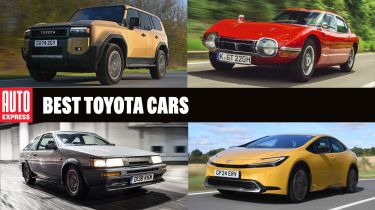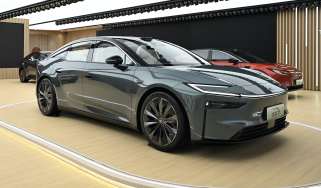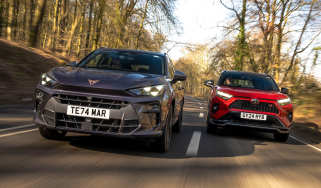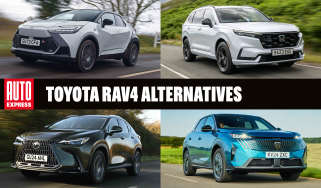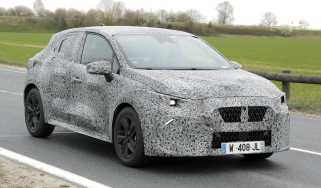Best Toyota cars: Our top Toyotas present and past
Want to know which are the best Toyotas to buy? Here is our guide to the brand’s best cars, present and past
Toyota sold almost 11 million vehicles in 2024, making it nothing less than the world’s biggest carmaker. The brand isn’t quite that prolific in the UK, but it still sells a wide range of solidly-built and well equipped cars in just about every market segment – from the compact Aygo X to the enormous Land Cruiser.
Most of Toyota’s cars are hybrids today, although you can now buy fully-electric Toyotas, too, and if you’re a driving enthusiast, then the GR Yaris is one of the best hot hatchbacks to buy right now. However, as we write this, the similarly entertaining GR86 and Supra sports cars are unfortunately no longer available.
That’s why they don’t appear on our list of the 10 best cars Toyota sells, but rest assured, the GR Yaris is there, as are popular family models such as the C-HR, RAV4, and Prius. Read on to see how we rate each new Toyota and continue to the bottom of the page for five of the brand’s all-time greats.
What makes Toyota’s cars special?
More than perhaps anything else, Toyota has become a byword in the automotive industry for reliability. Tales of Land Cruisers, Lexus LS400s (Lexus being Toyota’s luxury brand) and even humble Corollas covering huge mileages while needing just routine maintenance are commonplace, with even minor switches and displays still working perfectly after all that time.
The company has also played a big part in making the automotive industry as efficient as it is today. Between the forties and seventies, it developed the Toyota Production System, a means of carrying out mass production while minimising waste, time loss and inconsistency. The system majored on ‘just-in-time’ production to avoid the cost of keeping an enormous parts inventory, of clever application of automation, and of continuous improvement. Application of the Toyota Production System was a big part of Porsche’s nineties revival, making cars such as the Boxster and 996 far more cost-effective to produce than their predecessors.
But even aside from reliability and production efficiency, Toyota has always been capable of making great cars. Regular customers might appreciate their ease of use, but enthusiasts have had plenty to enjoy in the past, and in the present, too. Sports car lines such as the MR2, Celica and Supra have formed a huge part of the brand’s heritage, while the Land Cruiser and Hilux have done the same among rugged 4x4s. And we can’t forget the Prius, whose early steps in hybrid power laid the foundations for models from just about every modern manufacturer.
1. Toyota C-HR
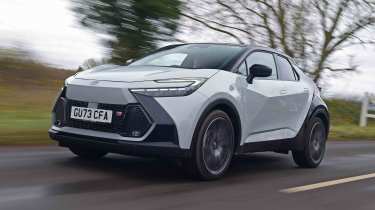
- Prices from £31,300 – £43,540
Pros |
Cons |
| Stand-out styling | Gloomy for rear-seat passengers |
| Still a good drive | No rear wiper |
| Real-world efficiency | 2.0 hybrid only available with expensive trim levels |
The original Toyota C-HR looked distinctive, but the latest model really stands out on the road – and is sure to be a big part of the car’s appeal in a market full of samey-looking crossovers. The other major C-HR selling point is the economy possible from its three hybrid powertrains: a 1.8-litre, a 2.0-litre and a 2.0-litre plug-in hybrid.
While pricing is a little punchy, straying well into the realms of fully electric rivals such as the Hyundai Kona Electric, the C-HR is good to drive, with keen handling that still maintains a supple ride, particularly on options with smaller wheels. Toyota’s hybrid systems are pretty responsive these days and less noisy than they used to be. It’s also hard to fault the fuel economy – the 1.8-litre unit is claimed to do 60.1mpg, a number that we found entirely possible to hit in real-world driving.
2. Toyota Corolla

- Prices from £30,505 – £35,985
Pros |
Cons |
| Comfortable ride | Rivals offer more boot space |
| Precise handling | Limited rear passenger space |
| Solid build quality | No plug-in hybrid option |
If you simply need a sensible hybrid family hatchback, rather than something madly powerful or pretending to be a 4x4, then the Toyota Corolla should do the job. It uses similar 1.8- and 2.0-litre hybrid drivetrains to the C-HR, albeit without the plug-in option, and they’re even more economical here, with figures of 64mpg from both. If you’re missing the economy that diesel cars of this size used to get, the Corolla is well worth a look for this reason alone.
It’s also accomplished in other areas, too, from its build quality and straightforward interior layout. There’s a big infotainment screen, and the heater controls involve actual knobs and buttons, while the instrument dials are proper circles, albeit digital ones. The ride is comfortable and handling is sophisticated. It’s not the most spacious family hatchback, but there’s always the Touring Sports estate version with its 596-litre boot for that.
3. Toyota RAV4
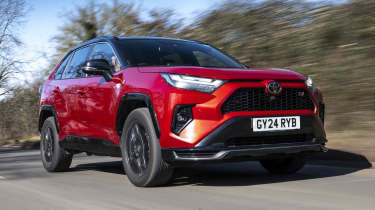
- Prices from £44,175 – £48,990
Pros |
Cons |
| Bold styling | Noisy engine |
| Great ride quality | Infotainment not up to class best |
| Decent running costs | Not available with seven seats |
The Toyota RAV4 is one of the world’s best-selling cars – its combination of practicality, reliability, hybrid power and chunky SUV styling meant the brand shifted more than a million units in 2024. And while it doesn’t quite top UK sales charts, it’s still popular here for all the same reasons, just as it has been since the original RAV4 made its debut in 1994.
The latest model gets 2.5-litre hybrid power, plus a plug-in hybrid variant with a seriously punchy 306bhp output – this is a mild-mannered family SUV that’ll get from 0-62mph in six seconds flat. But frugality is the real benefit of the RAV4, with nearly 50mpg in the regular hybrids and up to 46 miles of EV-only range in mixed driving. That range and 22g/km CO2 emissions put the plug-in into a relatively low nine per cent band for Benefit-in-Kind tax (BiK), so it’s a good company car choice, too.
4. Toyota GR Yaris
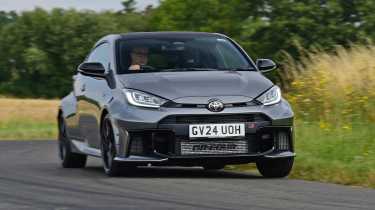
- Prices from £44,250 – £60,600
Pros |
Cons |
| Real-world usability | Firm ride |
| Subtly aggressive styling | A bit too expensive |
| Punchy power delivery | Awkward back seats |
The Toyota GR Yaris is the kind of performance car we thought manufacturers had abandoned: a proper road-going rally car, homologated for the heat of competition and sold in barely disguised form to lucky enthusiasts. It arrived in 2020 and we were immediately smitten, not least because it was priced at less than £30,000, making it genuinely affordable.
Sadly, the GR Yaris is not quite so wallet-friendly these days, and now starts at £45,000. Today’s 276bhp car is more powerful though, and has a bespoke, no-nonsense interior with a driver-focused dashboard and seats mounted usefully lower than in those early cars. It’s mighty on a B-road and just as good when the weather turns for the worse, thanks to its four-wheel-drive layout. Compared with a Golf R or other upscale hot hatches, it’s rough and ready, and all the better for it.
5. Toyota Prius
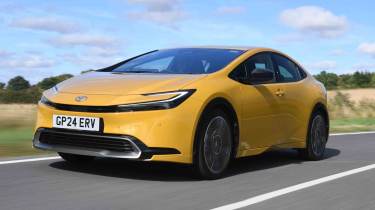
- Prices from £37,315 – £39,955
Pros |
Cons |
| Excellent performance | Firmer ride with 19-inch wheels |
| Fuel-efficient powertrain | Poor cabin practicality |
| Cabin comfort | Odd position of driver information display |
UK buyers very nearly didn’t get the latest generation Prius, but we’re glad Toyota changed its mind. While the C-HR and Corolla were doing quite nicely enough to suggest we didn’t really need the Prius any more, the current model is much more appealing than its predecessors, with genuinely striking styling, plenty of power and even quite a sporty driving feel.
A 220bhp plug-in hybrid powertrain is standard, delivering 0-62mph in a genuinely spritely 6.8 seconds, and more than 40 miles of real-world EV range. Plentiful power means the previous CVT drone has been largely banished under acceleration, while the slippery shape means minimal wind noise, too. The cabin also feels more upmarket, although the sharp new shape does limit rear-seat headroom and boot space.
6. Toyota Yaris Cross
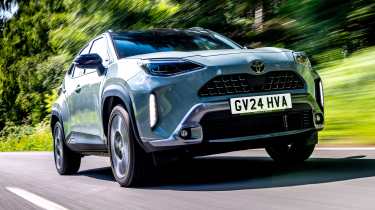
- Prices from £26,155 – £33,125
Pros |
Cons |
| Excellent fuel economy | Tight rear cabin space |
| Easy to drive around town | Feels cheap in places |
| Good finance deals available | Poor ride at higher speed |
The Toyota Yaris Cross takes the mechanicals from the very popular and extremely frugal Yaris Hybrid, and transplants them into a fashionable compact SUV body. Taller and heavier it may be, but the resulting Yaris Cross keeps much of the supermini’s economy benefits – up to 62.8mpg in the entry-level car – but with funkier styling and more space, particularly in the 397-litre boot.
Compared with some sportier rivals, the Yaris Cross isn’t a hot performer, although hybrid power gives it some low-end pep and means near-silent low-speed running. Unlike many competitors, you can also get the Cross with all-wheel drive, that version using an electric motor at the rear axle for a traction boost and a little more power. Interior materials feel cheap in a few places, but the cabin is generally well put together.
Latest Toyota Yaris Cross deals
7. Toyota Aygo X
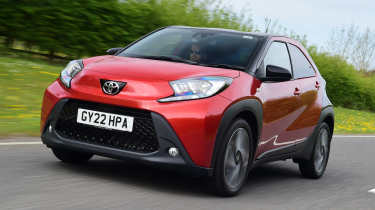
- Prices from £16,515 – £20,540
Pros |
Cons |
| Beefy looks | Rear cabin space |
| Well equipped | Dated interior |
| Convertible option | Same money as larger superminis |
Carmakers struggle to make a profit from truly small, cheap cars, which is why the Aygo X isn’t a dinky city car like its Aygo predecessor, but a pumped-up crossover. This is better than there being no tiny Toyota at all though, and while the X costs more than the old city car, it’s appealingly styled, well equipped and really rather likeable.
Mechanically Toyota has kept things simple, with a 1.0-litre three-cylinder petrol engine, and not a hybrid badge in sight. The Aygo X isn’t light, so it’s not that quick – 14.9 seconds from 0-62mph in the manual, and it needs working hard for that – but a real-world 50mpg is easily on the cards. While cramped, the bubbly cabin feels well built, and a sliding fabric roof option gives it a cheery feel, too.
8. Toyota Yaris
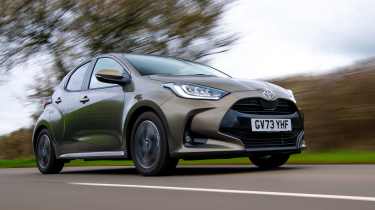
- Prices from £23,140 – £29,615
Pros |
Cons |
| Great fuel economy | Not as spacious as rivals |
| Lots of standard safety features | Noisy engine when extended |
| Entry-level models well equipped | Small boot |
Hybrid models used to make up the bulk of Toyota Yaris sales, so in 2020 Toyota sensibly made the new model hybrid-only. And short of buying a car with a plug, it’s probably about as efficient a vehicle as you’re likely to find on the new-car market, with claimed economy of 68.9mpg, and a real-world 65mpg well within reach.
That’s not bad given the 114bhp Yaris has a reasonable turn of pace, dipping under 10 seconds from 0-62mph, while a 128bhp model does the 0-62mph dash in 9.2 seconds. All versions are relaxing to drive, well equipped and have just enough passenger and boot space, while high-ish prices are offset by good residual values, of up to 54 per cent after three years or 36,000 miles.
9. Toyota Land Cruiser
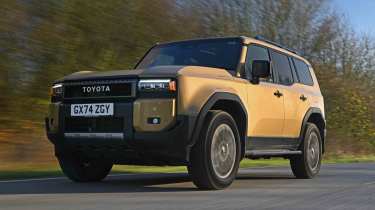
- Prices from £75,595 – £80,595
Pros |
Cons |
| Strong potential for reliability | High asking price |
| Capable performer off-road | Engine unrefined when revved |
| Competent handling on it | Limited model line-up |
The Toyota Land Cruiser is a bit like the Porsche 911 GT3 of off-roaders: iconic styling, huge capability in its intended environment and really difficult to get hold of. The UK’s allocation sold out more or less immediately, and with no date for when that allocation might be replenished, the prices above are more or less meaningless – those in possession get to choose how much you spend if they decide to sell.
The retro looks are inspired by Land Cruisers of the seventies and eighties, and in theory the new version should have those cars’ longevity, too. The 2.8-litre four-cylinder turbodiesel is pretty agricultural, but is tough and torquey. The ‘Cruiser is an absolute natural off-road, even if the bare stats can’t quite match those of a Land Rover Defender or Ineos Grenadier.
10. Toyota bZ4X
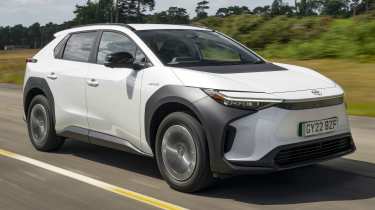
- Prices from £42,860 – £51,410
Pros |
Cons |
| Good to drive | Similarly priced rivals have more range |
| Comfortable | No front boot |
| Much-improved infotainment system | Raised rear floor |
Curious styling and a name like one of Elon Musk’s children don’t endow the Toyota bZ4X with immediate showroom appeal. But Toyota’s electric SUV does have several things going for it – not least 10 years of warranty cover (and indeed, Toyota’s reputation for reliability) to reassure anyone still not convinced by the longevity of electric vehicles.
It’s also good to drive, with brisk performance and the option of an all-wheel-drive version for those who need it. The 150kW charging rate goes some way to offsetting the only so-so 271 miles of range in the most efficient version – several rivals offer more than 300 miles. It does get very good Euro NCAP safety scores though, and it’s well equipped, with easy-to-use infotainment. It’s not a class-leader, but this EV is still a pretty good effort.
The best Toyotas of all time
Toyota Motor Corporation has been around since 1937, a year after Toyota Industries produced the company’s first ever car, the Toyota AA. In the intervening 88 years Toyota has become the world’s biggest car company, selling nearly 11 million vehicles around the globe in 2024 alone.
Some of its historical models stand out more than others though, and below we’ve picked five of our favourites. This quintet illustrates there’s far more to the brand than fuel-sipping family cars.
Toyota Celica
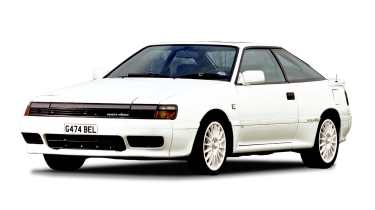
From the compact pony car of the seventies, through high-tech sports coupé, to WRC winner, to the lightweight and revvy model that disappeared in the mid 2000s, The Toyota Celica wore many faces over its 36-year life. The first three generations powered their rear wheels, before front-wheel-drive became the accepted layout in 1985 – with a diversion into all-wheel drive for the GT-Four rallying homologation specials.
The turbocharged GT-Fours are perhaps the best-loved Celicas, and also the best-remembered – if only for the cheating which got Toyota kicked out of the WRC in 1996. Early cars are rare but established classics, while the final seventh-generation model which appeared in 1999 is a hidden gem, and a bit of a bargain. All proved that Toyota could do style as well as speed.
Toyota Supra
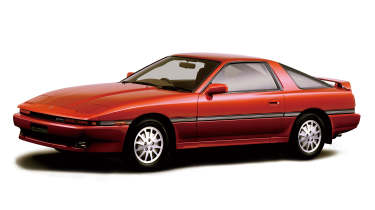
The very first ‘A40’ Toyota Supra sprung from the Celica platform in 1978, swapping four cylinders for six. And an inline-six engine has been a staple of the Supra ever since, including today’s heavily BMW-based car, although several four-cylinder versions have been available along the way.
Say ‘Supra’ though and most people will think of the ‘A80’ generation, which sold between 1993 and 2002. The Castrol-liveried racing cars from Japan’s JGTC series, Gran Turismo video games, tuned cars making huge power, and a starring role in the original Fast and the Furious movie, have all added to the Supra legend.
Toyota AE86 Corolla

Much like the Supra, the ‘AE86’ Toyota Corolla – also called Levin, Trueno, Corolla GT or Corolla Twin Cam depending on where in the world you are – has had its profile significantly boosted by media appearances. Whether you discovered it through gaming, the Initial D manga and anime, or grainy drifting videos on Youtube, it’s another darling of the Japanese car scene.
The AE86 was available with a robust and revvy 1.6-litre twin-cam, and its live axle and limited-slip diff meant steering with the throttle was always on the cards. It made BTCC appearances in the eighties, taking the 1986 and 1987 titles, and it became a hugely popular successor to the Mk2 Escort in Irish rallying, too.
Toyota GT86
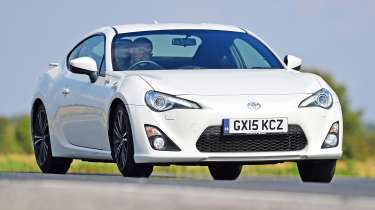
Reviving the 86 name for Toyota’s 2012 sports car was no coincidence – the GT86 was a spiritual, if not exactly direct successor to the AE86. Toyota paid the name homage with the 2.0-litre engine’s bore and stroke (86mm x 86mm) and the 86mm diameter of its tailpipes – but mostly with its traditional front-engined, rear-wheel-drive layout.
The car was co-developed with Subaru, whose BRZ had the same 2.0-litre naturally-aspirated flat four, while both cars had an unusual choice of tyre – relatively hard eco rubber, similar to that on the Toyota Prius, to give the car a livelier feel in corners and make the most of the engine’s modest torque. In 2021, Toyota launched the more powerful GR86 to address the original car’s criticisms.
Toyota 2000GT
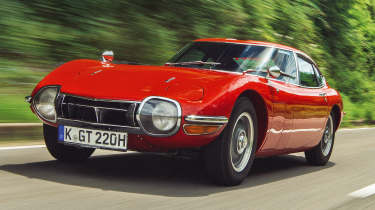
The Toyota 2000GT might be one of the most beautiful cars of all time. Launched in 1967, the 2000GT was designed and built in collaboration with Yamaha, which was also responsible for the car’s jewel-like twin-cam, 2.0-litre inline six – and the wood veneer found on the dashboard. The chassis, meanwhile, was not dissimilar to that of a classic Lotus Elan, with a backbone-style design that placed the front engine and rear differential between Y-shaped members.
While the shape draws similarity with the Jaguar E-Type, the 2000GT is around a foot shorter, and accommodation is quite tight as a result. It’s for this reason that Toyota built a special roofless version for the car’s most famous appearance in the media, 1967’s James Bond film, You Only Live Twice – simply so 6ft 2in Sean Connery could fit.
Interested in buying a new Toyota? Check out our current Toyota offers or configure one via our Find a Car service…

